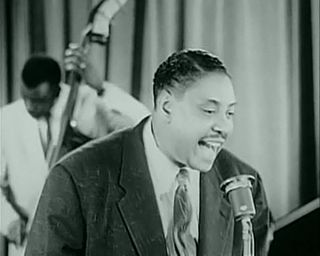
Rhythm and blues, frequently abbreviated as R&B or R'n'B, is a genre of popular music that originated within African-American communities in the 1940s. The term was originally used by record companies to describe recordings marketed predominantly to African Americans, at a time when "rocking, jazz based music ... [with a] heavy, insistent beat" was becoming more popular. In the commercial rhythm and blues music typical of the 1950s through the 1970s, the bands usually consisted of a piano, one or two guitars, bass, drums, one or more saxophones, and sometimes background vocalists. R&B lyrical themes often encapsulate the African-American history and experience of pain and the quest for freedom and joy, as well as triumphs and failures in terms of societal racism, oppression, relationships, economics, and aspirations.

Antoine Dominique Domino Jr., known as Fats Domino, was an American singer-songwriter and pianist. One of the pioneers of rock and roll music, Domino sold more than 65 million records. Born in New Orleans to a French Creole family, Domino signed to Imperial Records in 1949. His first single "The Fat Man" is cited by some historians as the first rock and roll single and the first to sell more than 1 million copies. Domino continued to work with the song's co-writer Dave Bartholomew, contributing his distinctive rolling piano style to Lloyd Price's "Lawdy Miss Clawdy" (1952) and scoring a string of mainstream hits beginning with "Ain't That a Shame" (1955). Between 1955 and 1960, he had eleven Top 10 US pop hits. By 1955, five of his records had sold more than a million copies, being certified gold.

"Shake, Rattle and Roll" is a song written in 1954 by Jesse Stone and first recorded that year by Big Joe Turner, whose version ranked No. 127 on the Rolling Stone magazine list of The 500 Greatest Songs of All Time.
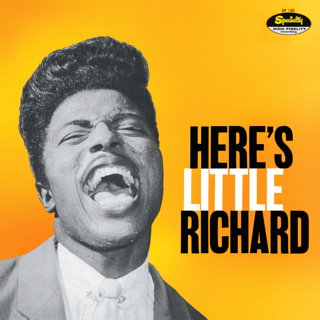
Here's Little Richard is the debut album by American musician Little Richard, released on March 4, 1957. Promoted as "six of Little Richard's hits and six brand new songs of hit calibre", the album compiles many of the A-sides and B-sides from Richard's hit singles including the Billboard top 40 entries "Tutti Frutti", "Long Tall Sally", "Slippin' and Slidin'", "Rip It Up" and "Jenny, Jenny" and the top 10 Rhythm and Blues Best-Sellers hits "Ready Teddy", "She's Got It" and "Miss Ann".

"Roll Over Beethoven" is a 1956 song written by Chuck Berry, originally released on Chess Records, with "Drifting Heart" as the B-side. The lyrics of the song mention rock and roll and the desire for rhythm and blues to be as respected as classical music. The song has been covered by many other artists, including the Beatles and the Electric Light Orchestra. Rolling Stone magazine ranked it number 97 on its 2004 list of the "500 Greatest Songs of All Time".
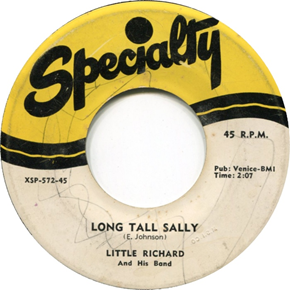
"Long Tall Sally", also known as "Long Tall Sally (The Thing)", is a rock and roll song written by Robert "Bumps" Blackwell, Enotris Johnson, and Little Richard. Richard recorded it for Specialty Records, which released it as a single in March 1956, backed with "Slippin' and Slidin'".
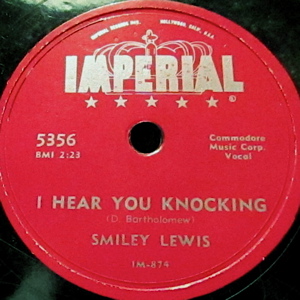
"I Hear You Knocking" is a rhythm and blues song written by American musician Dave Bartholomew. New Orleans rhythm and blues singer Smiley Lewis first recorded the song in 1955. The lyrics tell of the return of a former lover who is rebuffed.

"You Send Me" is a song written and originally recorded by American singer Sam Cooke, released as a single in 1957 by Keen Records. Produced by Bumps Blackwell and arranged and conducted by René Hall. The song, Cooke's debut single, was a massive commercial success, becoming a No. 1 hit on both Billboard's Rhythm & Blues Records chart and the Billboard Hot 100.

"Kansas City" is a rhythm and blues song written by Jerry Leiber and Mike Stoller in 1952. First recorded by Little Willie Littlefield the same year, as "K. C. Loving", the song later became a chart-topping hit when it was recorded by Wilbert Harrison in 1959. "Kansas City" is one of Leiber and Stoller's "most recorded tunes, with more than three hundred versions", with several appearing in the R&B and pop record charts.
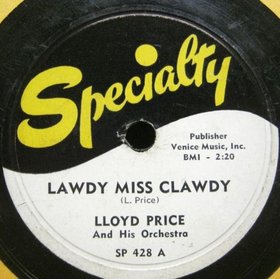
"Lawdy Miss Clawdy" is a song by New Orleans singer-songwriter Lloyd Price that "grandly introduced The New Orleans Sound". It was first recorded by Price in 1952 with Fats Domino and Dave Bartholomew during his first session for Art Rupe and Specialty Records. The song became one of the biggest selling R&B records of 1952 and crossed over to other audiences. "Lawdy Miss Clawdy" inspired many songs and has been recorded by a variety of artists.

"Bo Diddley" is a song by American rock and roll pioneer Bo Diddley. It introduced the rhythm that became known as the Bo Diddley beat and topped the Billboard R&B chart for two weeks in 1955. The song is included on many of Diddley's compilation albums including Bo Diddley (1958) and His Best (1997). Buddy Holly recorded a version that became his highest-charting single in the UK.
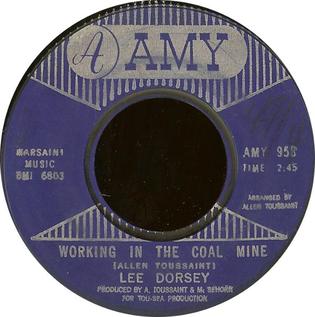
"Working in the Coal Mine" is a song with music and lyrics by the American musician and record producer Allen Toussaint. It was an international hit for Lee Dorsey in 1966, and has been recorded by other musicians including Devo in 1981.

"Who Do You Love?" is a song written by American rock and roll pioneer Bo Diddley. Recorded in 1956, it is one of his most popular and enduring works. The song represents one of Bo Diddley's strongest lyrical efforts and uses a combination of hoodoo-type imagery and boasting. It is an upbeat rocker, but the original did not use the signature Bo Diddley beat rhythm.
"Come On" is a song written by New Orleans rhythm and blues artist Earl King. He first recorded the song as "Darling Honey Angel Child" in 1960 for the Ace Records subsidiary Rex. Later that year, he recorded it as a two-part song for Imperial Records using some new lyrics. Retitled "Come On", it was released in 1960 with "Come On – Part I” as the A-side backed with “Come On – Part II”.
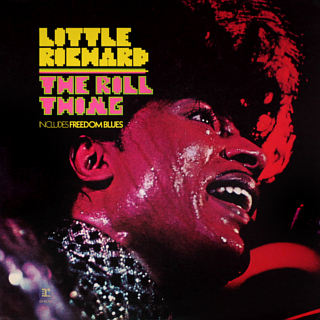
The Rill Thing is Little Richard's first album for Reprise Records, released in August 1970. It was considered a comeback album for Richard, following a three-year hiatus on new albums and an acclaimed performance at Atlantic City Pop Festival. The album utilizes a soul-influenced sound and contains Little Richard's biggest post-Specialty single in "Freedom Blues", which broke the Billboard top 50. The follow-up single, "Greenwood, Mississippi" made the top 100 and number 56 on Cashbox Black Singles. Despite the success of the singles, the album failed to chart.

This page is a discography for American musician Little Richard (1932–2020). Described as "the architect of rock and roll", Little Richard was a pioneering singer-songwriter whose career also encompassed rhythm and blues, soul, and gospel. He began his recording career in 1951, signing to RCA Victor, releasing his first singles, and his first album in 1957, although he released his last album in 1992, he continued to tour into the 21st century. He attained international success after signing with Specialty Records in 1955.

"Take Me in Your Arms (Rock Me a Little While)" is a song written by the premier Motown songwriting/production team of the 1960s Holland–Dozier–Holland. The first hit recording was sung by Kim Weston in 1965. It was most popular in 1975 when it was recorded by the Doobie Brothers.
"Chains Of Love", a 12-bar blues, was written by Doc Pomus.
"Barefootin'" is a 1966 song written and performed by Robert Parker. "Barefootin'" was arranged and produced by Wardell Quezergue in 1965. Parker's record label, Nola Records, claimed that the record sold over one million copies.
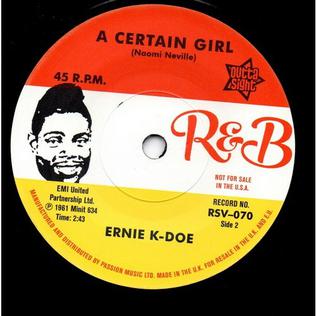
"A Certain Girl" is a rhythm and blues song written by Allen Toussaint, with the credit listed under his pen name Naomi Neville. New Orleans R&B singer Ernie K-Doe recorded it in 1961. Minit Records released the song as the B-side of "I Cried My Last Tear".

















